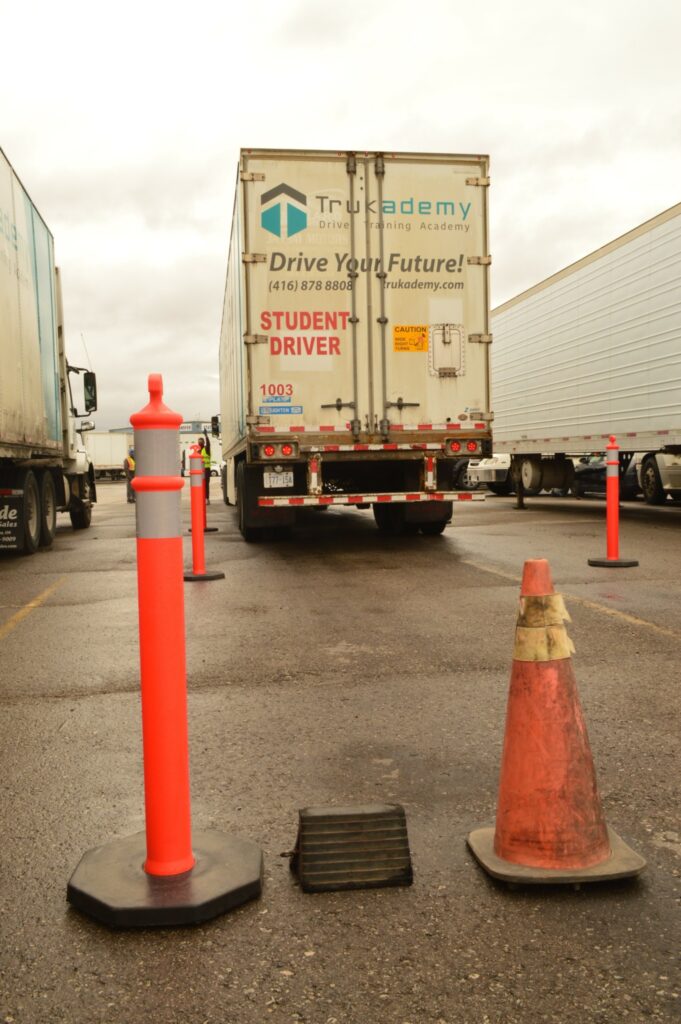International student cap to squeeze driving school enrolment
International student N.S. (who spoke on condition of anonymity for fear of jeopardizing his immigration chances) has a hectic schedule. He attends classes in college, studies, works and is also learning to drive a truck.
He is banking on earning an A/Z licence to secure his dream for a better life in Canada. N.S. and many like him flock to Brampton, Ontario’s trucking hub in a bid to secure permanent residency and citizenship down the road.
These students, filled with big dreams of settling in Canada, help fill the pipeline in an industry suffering from driver shortages and a greying trucker population. But that pipeline is drying up.

The federal government on Jan. 22 capped the number of international student permits over the next two years. It will approve approximately 360,000 undergraduate study permits for 2024 — a 35% reduction from 2023.
More than 800,000 foreign students were in Canada in 2022, up from 214,000 a decade earlier. Each province and territory will get permits according to population, and Ontario is likely to see a 50% cut from present numbers.
“Driving schools in Brampton are fed by international students,” said Manan Gupta, regulated Canadian immigration consultant and president of Skylake Immigration based in the city. “Their intake is going to suffer.”

Surinder Batth, director of Global Truck Academy in Brampton agreed that driving schools will be hit hard. “We rarely get trainees who are permanent residents, they are mostly students or former students on a work permit,” he said.
Batth added that many have no option but to drive a truck. “They don’t have other skills. This is a well-paying job, and it is easy to enter this profession,” he said.
Raj Walia, owner of Trukademy based in Mississauga, Ont., said international students form a large part of trainees at truck driving schools in the area. He added there are schools in Brampton whose trainee intake is 60-70% international students, and they will be affected.
“It will impact the training business and the overall trucking industry down the road,” he said.
Student expenses
For 23-year-old international student N.S., every day is a grind, and the focus is on survival. It is also expensive.
He pays $550 for a room which he shares with another student. There are six students living in the Brampton home, sharing three bedrooms. Rent, food, travel and phone expenses, along with basic necessities cost about $2,000 a month.
He has washed trucks, worked in warehouses and made door-to-door deliveries to help pay the bills.
“It is difficult to manage studies, work and truck driver training. Some things suffer,” N.S. said. “Studies and truck training are going well but work is suffering and I cannot earn money. Money is a problem.”
He saved money realizing that he would not have time to work during driver training. He’s placed all his bets on trucking and is hoping it works out as his funds dwindle.
Attestation letter requirement
International students planning to study in Canada now face an additional hurdle. In addition to the cap, the federal government will also require people applying for a permit to provide an attestation letter from a province or territory.
Immigration consultant Gupta said most provinces and territories are not ready for this and there is no system in place to issue these letters. The feds have given provinces until March 31 to come up with a system to issue the letters, he added.
Ottawa is targeting diploma mills and the concern that the growing number of international students is putting pressure on the housing market.
From September, work permits will not be granted for students graduating from colleges that operate under a public-private partnership (PPP) model.
Gupta explained that Ontario has 24 public colleges funded by the government. Other colleges have opened campuses in the GTA in collaboration with institutes. These PPP college students will not get post-graduate work permits.
Worker exploitation
He added that earlier, international students in diploma programs could get their spouses here on work permits. The government will now issue these only to students in master’s or higher programs.
“This is aimed at putting an end to contractual and bogus marriages,” he noted, of a tactic that was used by some to find work in Canada.
Navi Aujla, executive director, Labour Community Services of Peel, said the way the immigration system is set up allows for exploitation of workers.
“People get into trucking to obtain their permanent residency, and they are being taken advantage of,” she said, referring to instances where drivers have not been paid their wages.
Aujla added that the government blames immigrants for problems, but it is the government that has created a system that makes people vulnerable and allows employers to exploit them.
Labor shortage likely in warehouses
Gupta warned that these changes will also affect warehousing, logistics and last-mile delivery businesses, besides minimum-wage jobs like fast-food restaurants and the service industry. Many workers doing these jobs are international students. “A city like Brampton is going to face the music,” he warned.
Meanwhile, N.S. is counting down the days to when he can hit the road with an A/Z licence in his possession. He is pinning his hopes on a cousin who works as a professional driver and plans to work in the same company.
He has heard that his chances of obtaining permanent residency are better in the Atlantic provinces and is willing to move there if offered employment. Until then, he continues to study, work and train for his future in Canada.
Have your say
This is a moderated forum. Comments will no longer be published unless they are accompanied by a first and last name and a verifiable email address. (Today's Trucking will not publish or share the email address.) Profane language and content deemed to be libelous, racist, or threatening in nature will not be published under any circumstances.
Hi Leo- why can’t truckk news be honest when relating to our commercial driver challenges? Majority of unskilled drivers are from the third world and are involved in 95% of all commercial accidents,previously I was involved in commercial accident investigation and firmly believe our government has shown little interest in upgrading class 1 license since 1971-“last upgrade”. sixteen kids killed in humbolt and minimal change in licensing. – thanks
-
Well said we need to stop bringing in cheaper foreign students and others that do not have a mechanical background to become truck driver or heavy equipment operator
I see many people that do not know how to drive in snow

This is why we need to limit foreign students and the students use this as a backdoor way to get into to Canada for lower wage and lower skilled workers
We have no housing 300 000 homeless and over 20 000 truck drivers and some lease ops unable to find work at this time mostly in ont and Vancouver
Over 5000 truck drivers have left Canada in 2023 because of poor rates and wages some have went back India or got jobs in the U S as they married a U S spouse